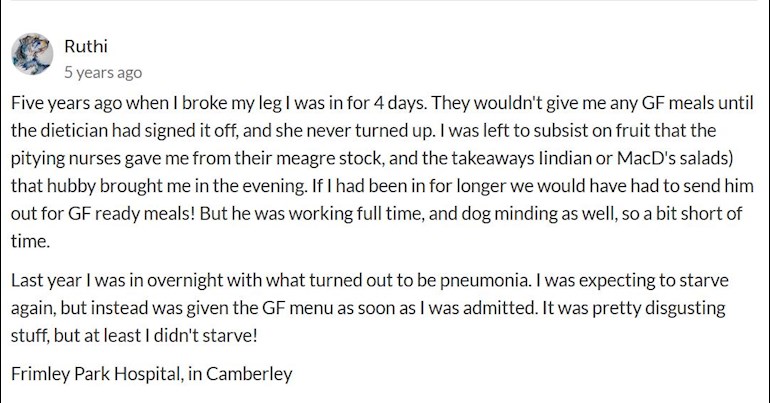I've been contemplating this after another food issue this week and it seems, under current standards, this is what Coeliac sufferers in UK are faced with:
- Late/non diagnosis. For some it can take decades to have a diagnosis, despite clear and obvious symptoms. Too many have to resort to figuring the issue out for themselves, and then continue to be negated by clinicians;
- Gaslighting by GPs and consultants. Shunted off in every which direction for every which test whilst the obvious condition of coeliac is not tested for or not properly tested for (GP belief that one blood test is the 'gold standard'). Some individuals have been told it's 'all in their mind' and been referred for counselling/put on antidepressants;
- Failure by many GPs to appreciate the need to keep gluten/have gluten in diet for testing;
- Negation of symptoms and failure for GPs and consultants to join the dots - many only see coeliac as a digestive disease, not one that effects neurologically, joints, organs, etc;
- Poor gluten free labelling laws where manufacturers do not have to declare ingredients derived from gluten source or whether product is produced in same factory/production line as gluten;
- Failure by Foods Standards Agency to tackle errant food manufacturers;
- Failure by local authorities to apply law with/penalise food outlets that provide 'gluten free' menus but staff not trained in gluten free procedures/food contains gluten;
- Failure by Ceoliac UK, the dedicated charity for coeliac sufferers in UK, to take onboard and address concerns of coeliac sufferers in all of the above;
- Ongoing denial by CUK/Food Standards Agency/NICE to sit down and properly research the 20ppm codex rule/allowance and negation of the many coeliac sufferers who report issue with this level. This may be a European/International directive, but it is not working for many and nothing to stop UK agencies bucking the trend of accepting this level as a given;
- Failure by Coeliac UK/NICE to ensure GPs are coeliac aware. There is no obvious plan/campaign to tackle this and thousands of people suffer for that. Coeliac UK offset the blame, but they are wholly failing in this. This is the frontline stuff they need to tackle, but don't. We are told, statistically, 1 in 100 have coeliac, but only 10% of people ever get diagnosed. That is criminally insane that this level of medical negliligence if happening and CUK are sitting on their hands and looking the other way/offsetting blame;
- Suspicion that Coeliac UK are more on side of manufacturers than coeliac sufferers for financial gain and happy to turn blind eye to all the products/practices that are keeping coeliacs ill, for fear of losing profit/income;
- No representative voice/body for 'highly sensitive' coeliacs - so those who do not tolerate any ppm of gluten. This is estimated to be 10% of known ceoliacs. This is a high number and these people are left to flounder and suffer for the lack of representation/lobbying for better standards;
- Negations of 'highly sensitive' ceoliacs concerns by CUK, and accounts of individuals being gaslighted into believing they may have additional medical conditions rather than admit the 20ppm codex level is flawed. This then filters down to GP and NHS dietician level as they believe 'gluten free' actually means gluten free - they are ignorant of the codex level, and probably will investigate for other medical conditions. All of this costs NHS and presents risk for coeliac sufferers;
I for one am fed up living with such poor standards. I have been directly impacted by all of the above. Coeliacs should not have to live limited lifestyles on the basis of very well paid people ignoring/negating/gaslighting their illness and medical requirement for better standards and processes. There is possibly few other life-limiting impactful illnesses that recieve such a poor show from the medical profession and associated bodies. This is simply not good enough and too many coeliac sufferers simply accept this as their lot.
What can we do, collectively, to change this situation?
(By way of example of the absurdity of what coeliac suffers in UK suffer, here's a post pictured from FionaGFG (Administrator) "Have you found it hard to get GF meals in hospital?" This is a human rights violation.)

